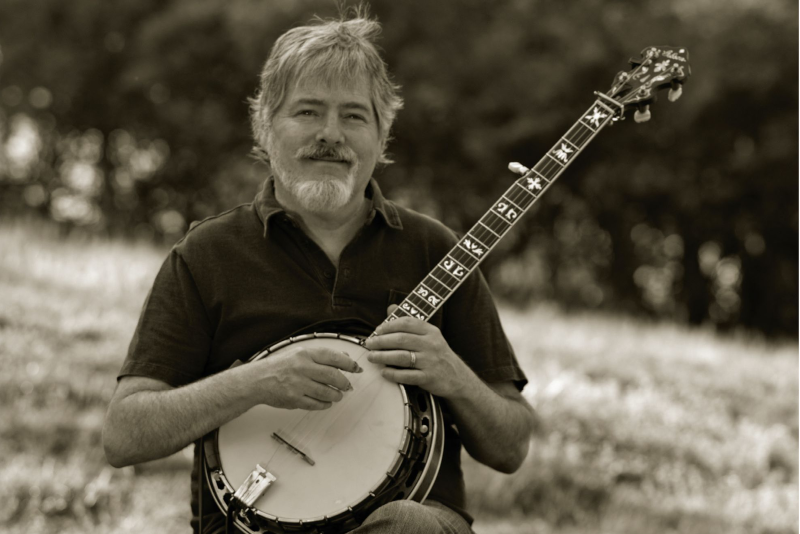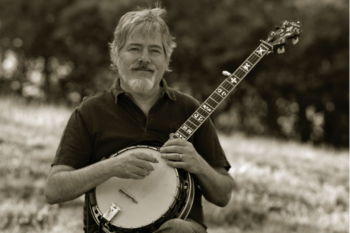

“They nearly always come back,” said Béla Fleck. “All the people that leave bluegrass. I had a strong feeling that I’d be coming back as well.”
My Bluegrass Heart, out September 10, 2021 on Renew Records, is that return the 15-time Grammy winner is talking about – the third chapter in a decades-spanning trilogy which, by his counting, started with 1988’s Drive and continued with The Bluegrass Sessions, released eleven years later. Over the long and lauded course of his unique creative run, Fleck – the world’s premier banjo virtuoso and a celebrated musical adventurer – has both dug deep into his instrument’s complex global history and unlocked the breadth of its possibilities. My Bluegrass Heart is a homecoming in sound, to be sure.
And when you travel, you bring home something new. When the endlessly curious Fleck prepared to make The Bluegrass Sessions, for example, he contemplated some other musical wanderers: “It was ten years after the Drive album, and I had been doing the Flecktones for all that time; I was coming back thinking hmm… what have I learned that I can bring back to bluegrass?” he said. “It resonated with me how Coltrane and Charlie Parker, after studying a lot of music from outside of the jazz world, brought some truly great things back to it from the outside.” In some ways, Béla Fleck has always thought of himself as coming from the outside of bluegrass. “I don’t come from the South, and I always felt like there were people who were more truly focused on doing that bluegrass thing really well. What I tended to want to do more was expand the banjo’s role and look for new things to do with it. Despite that, I was always a bluegrass guy first and foremost. That was certainly the root of my musical soul.” Born in New York City and named for the classical giants Bartok, Webern, and Janacek, Béla Anton Leos Fleck first tuned into his musical soul through TV, radio and a lucky encounter on a train ride (just after having received his first banjo from his grandfather) with a banjo player who saw the instrument young Béla was toting, tuned it up, and pointed him to Pete Seeger’s book How To Play The Five-String Banjo. A move to Kentucky some years later immersed him in the sound’s heartland, and led to a spot in the acclaimed progressive bluegrass band New Grass Revival. That stint, in turn, led to the Drive album (now often considered a classic) and the collection of Fleck’s core group of bluegrass comrades, including mandolinist and fellow New Grass Revivalist Sam Bush, guitarist Tony Rice, fiddle player Stuart Duncan, bassist Mark Schatz and dobro player Jerry Douglas, who all (except for Rice, who passed away in 2020) appear on Drive, Bluegrass Sessions, and now, My Bluegrass Heart. More than anything, it was this group of musicians that drew Fleck home to bluegrass the third time. As the years since Bluegrass Sessions stretched into decades, compositions that seemed earmarked – consciously and unconsciously – for that gang began to pile up. He was hesitant to begin, in no small part because Rice, who was battling ill health, was unavailable: ” Some part of me had been waiting and hoping for him to maybe reappear, because it was such a glorious experience playing with him, and nobody had really taken his place for me,” said Fleck. “Tony Rice was the enabler, the guitar player who made me play the way I wanted to play.” But he didn’t want the songs to disappear, either. So he started looking closer at the bluegrass scene and discovered, to his delight, a new generation of players had been flourishing, some of whom he knew – like mandolinist and MacArthur fellow Chris Thile, or multi-instrumentalist Sierra Hull, whose Grammy-nominated 2016 album Weighted Mind Fleck had produced – and some he didn’t, like rising star Billy Strings and fiddle avant-gardist Billy Contreras, who Thile introduced him to. Old friends made new ones, and together they made a record – one that bridges musical generations. And what started as a single album became a double album. “When I play with my peer group, Sam, Jerry, David, and those cats, I might be a little cautious to direct them, because I don’t want to tell my peer group what to play,” Fleck said. “They’ve been heroes of mine forever, and they have excellent musical judgement. Also I have a bit of a jazz aesthetic, in which you want to provide an un-detailed sketch in order to enable creativity. But with the younger folks, they’ll often ask me, ‘What do you want here?’ I’m like, ‘Okay, since you’re asking’…” he laughed. ‘There really doesn’t have to be a hard and fast rule; great music can come from all approaches.” In seriousness, though, My Bluegrass Heart is vividly collaborative, and part of Fleck’s talent as a leader is encouraging his bandmates to shine. “Bela’s been a hero of mine for years now,” Sierra Hull said. “One of the really cool things about this project is just to be in the company of someone like Sam Bush or David Grisman. Having grown up loving that music, the thought of getting to be part of this is, to me, extremely special.” But Fleck also placed Hull on the level of her heroes, she thought. “He took such a collaborative spirit with this,” she said. “He has an ability to bring out the best in people, to allow them to bring what they’re good at and let them shine.” “That’s the way good music happens, to me,” said Fleck. “If there’s kind of a leading force that’s gently nudging it in a certain direction, but you’re also taking advantage of all the natural ideas that everyone comes up with. To me, that’s what group music should be all about. You want to see what people come up with on their own, and say as little as possible, til it’s needed.” “In my opinion, Béla Fleck is one of the most important musicians of all time,” said Billy Strings. “He bridges the gap between bluegrass, classical, jazz, world music, and everything in between. It seems like there’s no limit to what he can achieve on the banjo.” “Béla Fleck is my hero,” Strings continued. “So when I got the call to play on this record, I felt like a young Jedi who’s just gotten the rare opportunity to go train with master Yoda. Though it was a challenge to learn the music, it’s an honor to have been trusted to sit in the guitar chair for these songs. To play alongside these fantastic musicians in the studio was a dream come true, and I’ll never forget it.” If the band is an amalgamation of generations, ideas and style, the songs are maybe even more so. What else would you expect from Béla Fleck? “It’s not a straight bluegrass album, but it’s written for a bluegrass band,” he explained. “I like taking that instrumentation, and seeing what I can do with it – how I can stretch it, what I can take from what I’ve learned from other kinds of music, and what can apply for this combination of musicians, the very particularly ‘bluegrass’ idea of how music works, and what can be accomplished that might be unexpected, but still has deep connections to the origins. That’s what I was going for, though I hadn’t done it in a long, long time.” He wasn’t just twiddling his thumbs for that long, long time. The Flecktones, the project that immediately followed New Grass Revival, recently celebrated 30 years of melding acoustic with electronic and bluegrass with jazz and funk. There’s also his duo albums and tours with jazz legend Chick Corea and life partner Abigail Washburn, the Brooklyn Rider String Quartet, 3 classical banjo concertos, an amazing collaboration with Indian musical royalty: Zakir Hussain, Rakesh Churasia and old friend/bass genius Edgar Meyer. And don’t forget his award-winning 2009 documentary Throw Down Your Heart, which explored the African origins of the banjo. Those travels, literal and mental, inform what he brought home to My Bluegrass Heart. The slinky “My Little Secret,” for example, was originally written for a chamber orchestra; giving those string charts to a bluegrass ensemble turned out to be an exciting new way of orchestrating the traditional instrumentation. The intricate, slow-creeping “Charm School,” with its wide-open, jazz-style jam and energetic interplay between soloists showed off the individuality within the group. “Vertigo,” first written and performed for what Fleck calls the Telluride “House Band,” including Sam Bush and Jerry Douglas, plays rhythmic tricks that mimic its loopy title. (Ironically a few months after writing and performing Vertigo, Béla contracted the real thing, which was no joke, although thankfully it was short lived! Instant karma?)And the closer, the shimmering and ethereal “Psalm 136” – a piece Fleck says originated with a Jewish tribe in Uganda, which he arranged for My Bluegrass Heart working late into the night in tandem with Chris Thile – is a nod to the banjo’s African origins. The album’s ace ensemble cast had one more essential participant, in spirit: NEA Jazz Master Chick Corea, whose 2007 collaboration with Fleck, The Enchantment, earned a Latin Grammy award for best instrumental album. Béla felt a parallel, he said, between the Italian keyboardist’s special affinity for Latin music, and his own for bluegrass. “Anytime he was exploring a Latin way of playing, it seemed like his soul showed itself,” Fleck said. My Spanish Heart, Corea’s 1976 jazz-Latin fusion album, had knocked his socks off. “It was so unique,” he said. “It was unlike any Spanish music I had heard before, and it was at the center of who Chick was, despite the fact that he’s not Spanish, but Italian. I could relate to that, being a bluegrass freak from New York City with no visible connection to the music.” Fleck went to his old friend, with whom he often shared recordings of work in progress, and asked for permission to pay homage with the title of My Bluegrass Heart. “And he laughed and said ‘Yeah, man. Go for it!” said Fleck. Chick Corea died at the beginning of 2021. Like the late Tony Rice, his spirit infuses My Bluegrass Heart. And whichever of his many styles Béla Fleck is playing, that’s the secret, he said – the people. “That’s my dirty little secret,” he laughed, “that I don’t play that differently from genre to genre. It’s about who I surround myself with. Bluegrass though – it’s central to everything I do”